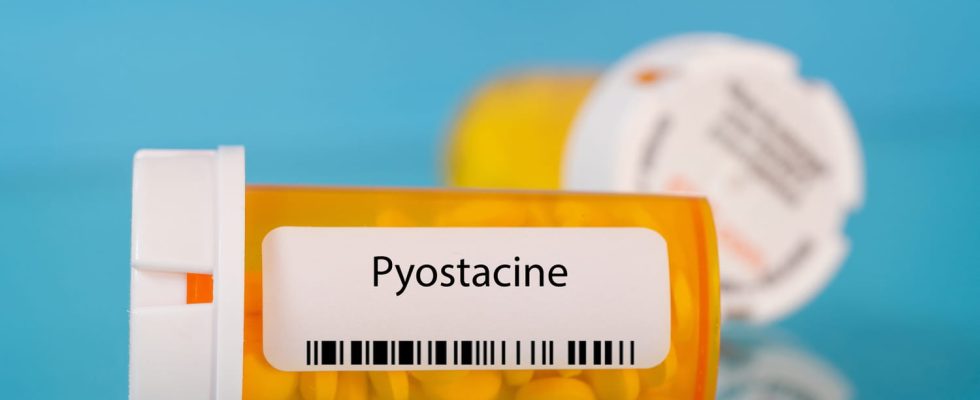Pysostacin is an antibiotic used in the treatment of certain ENT infections of bacterial origin such as sinusitis or pneumonia. You need a prescription.
What is pyostacin?
Pyostacin is an antibiotic medication used in the treatment of certain bacterial infections of the sinuses, bronchi, lungs and skin. “Its active substance is pristinamycin, a molecule that destroys bacteria. Pyostacin belongs to the family of streptogramins (synergistins) which are particularly effective against staphylococci“, specifies Yves Dour, doctor of pharmacy. This medicine is subject to medical prescription and is available in the form of 250 mg or 500 mg tablets. It can be used in children aged 6 and over and in adults.
Indications: why take pyostacin?
Pyostacin is reserved for the treatment of certain ENT infections of bacterial origin such as:
- Acute maxillary sinusitis
- Acute exacerbations of chronic bronchitis
- Community-acquired pneumonia of mild to moderate severity
- Skin and soft tissue infections.
“On the other hand, pyostacin is contraindicated in cases of allergy to synergistins, in cases of allergy to starch as well as in cases of history of skin rash following taking pristamycin. underlines the specialist.
What dosage?
“The dosage may vary depending on the pathology encountered. In all cases, you should refer to your doctor’s prescription. In case of doubt or problem, you should seek advice from your pharmacist“, indicates Yves Dour. The recommended dosage is as follows:
► In adults: 1 g (4 tablets of 250 mg or 2 tablets of 500 mg), 2 to 3 times a day depending on the pathologies.
► In children: 50 mg per kg per day, in 2 or 3 doses; or, for example, for a child weighing 20 kg: 2 tablets of 250 mg or 1 tablet of 500 mg, morning and evening.
How long does it take to be effective?
“Effectiveness should be felt after 24 to 48 hours, which is the case for most antibiotics.“, observes the pharmacist.
What are the side effects and dangers?
The most common adverse effects linked to the administration of pyostacin are: vomiting, diarrhea, digestive disorders. In very rare cases, a rash may occur.
Can we expose ourselves to the sun?
“The molecule does not present any risk in the event of solar exposure. reassures the pharmacy doctor.
What is the price and is it refunded?
Pyostacin is reimbursed up to 65% by Health Insurance. It costs 9.09 euros for the box of 16 250 mg tablets and 18.08 euros for the box of 16 500 mg tablets.
Thanks to Yves Dour, doctor of pharmacy
